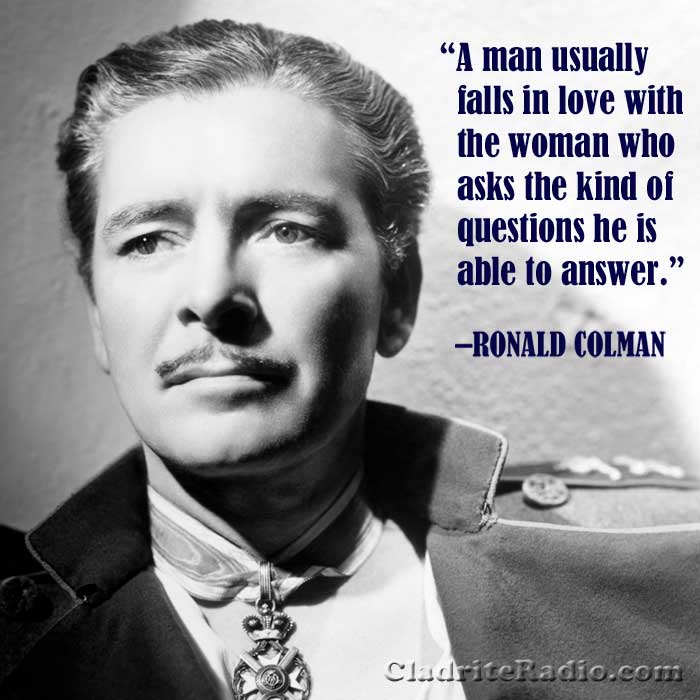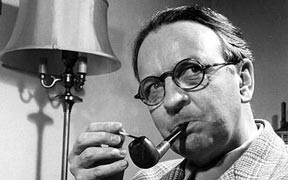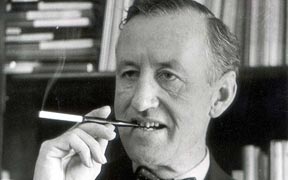Here are 10 things you should know about Ronald Colman, born 133 years ago today. His was one of the most memorable voices in Hollywood history.
Tag: Bulldog Drummond
10 Things You Should Know About Reginald Denny
Here are 10 things you should know about actor Reginald Denny, born 130 years ago today. He transitioned successfully from leading man status in the silent era to character roles as talkies took over.
10 Things You Should Know About Joan Bennett
Here are 10 things you should know about Joan Bennett, born 110 years ago today. She exhibited excellent range as an actress and enjoyed success on the stage, in films and on radio and TV.
Happy 126th Birthday, Ronald Coleman!
The suave and sophisticated Ronald Colman was born 126 years ago today in Richmond, Surrey, England. Here are 10 RC Did-You-Knows:
- Colman was the youngest of four children. He attended boarding school in Littlehampton, where he was first exposed to acting, but he intended to study engineering at Cambridge until the family’s financial fortunes declined with the premature death of his father in 1907.
- As a member of the London Scottish Regiment, Colman served in World War I. At the Battle of Messines, he was wounded by shrapnel in his ankle, which gave him a limp he tried to hide for the rest of his life. He was discharged from service within weeks.
- By 1916, Colman was a busy actor, appearing in a variety of stage productions in London’s West End. In 1920, he toured the United States in a play called The Dauntless Three, which led to success on Broadway.
- Though he had appeared in a handful of British films, it was Colman’s work in his first American film, The White Sister (1923) opposite Lillian Gish, that proved to be his breakout role. He became very popular with the public in both romance and adventure pictures.
- For all his success in silent pictures, Colman’s star ascended even higher in talkies, which allowed him to use to his advantage one of his greater assets as an actor, what the Encyclopædia Britannica described as his “resonant, mellifluous speaking voice with a unique, pleasing timbre.”
- In 1930, Colman was nominated for the Best Actor Oscar for his work in two different pictures—Condemned and Bulldog Drummond. In total, he would be nominated as Best Actor for four films, winning once for A Double Life (1947).
- Christopher Walken, whose given name is Ronald, was named for Colman.
- Colman’s speaking voice was so widely admired that it became something of a cultural touchstone, mentioned in a number of motion pictures and novels, including Ralph Ellison‘s Invisible Man.
- Colman was also active in radio in the 1940s and ’50s, making frequent guests appearances on The Jack Benny Show, hosting a program called Favorite Story in the and starring on The Halls of Ivy, which later became a television program.
- Colman was contracted to star in the MGM picture Village of the Damned (1960), but following his death in 1958 from acute emphysema, George Sanders took over the role.
Happy birthday, Ronald Colman, wherever you may be!

A meeting of the minds, ca. 1958
 One doesn’t—at least, we didn’t—associate Raymond Chandler and his private eye protagonist Philip Marlowe with the espionage adventures of Ian Fleming‘s James Bond. The characters live in two different eras, for one thing, with very little overlap in the 1950s. But the two authors, born twenty years apart—Chandler in 1888, Fleming in 1908—were members of a sort of mutual admiration society, and in 1958, someone at the BBC got the idea of placing them in a radio studio before a pair of microphones and giving them some time to discuss the art of the “thriller,” a term they use to encompass both Chandler’s hard-boiled, Los Angeles-bound detective fiction and Fleming’s globe-trotting spy stories.
One doesn’t—at least, we didn’t—associate Raymond Chandler and his private eye protagonist Philip Marlowe with the espionage adventures of Ian Fleming‘s James Bond. The characters live in two different eras, for one thing, with very little overlap in the 1950s. But the two authors, born twenty years apart—Chandler in 1888, Fleming in 1908—were members of a sort of mutual admiration society, and in 1958, someone at the BBC got the idea of placing them in a radio studio before a pair of microphones and giving them some time to discuss the art of the “thriller,” a term they use to encompass both Chandler’s hard-boiled, Los Angeles-bound detective fiction and Fleming’s globe-trotting spy stories.
The half-hour program is available for streaming via the  “I kicked myself over that,” Fleming admits, “because I rather pride myself on trying to get these details right, and that was a very bad break.”
“I kicked myself over that,” Fleming admits, “because I rather pride myself on trying to get these details right, and that was a very bad break.”
Fleming later asks Chandler how mob killings are arranged, and Chandler is happy to oblige with a lengthy account of how such hits are carried out.
Fleming also notes the difference between the pair’s respective protagonists, noting that Marlowe is “a real hero; he behaves in a heroic fashion.”
Not so Bond, says his creator.
“My leading character, James Bond, I never intended to be a hero,” insists Fleming. “I intended him to be a sort of blunt instrument wielded by a government department, who would get into these bizarre and fantastic situations and more or less shoot his way out of them — get out of them one way or another. Of course, he’s always referred to as a hero, but I don’t see him as a hero myself. I think he’s, on the whole, a rather unattractive man.”
Fleming goes on to admit that, as Chandler suggests, that he did allow Bond some feelings and sentiment in Casino Royale, but the two men agree that while a man in Bond’s line of work might experience emotions, he must, as Chandler puts it, “quell them.”
Fleming states that he is impressed with Marlowe’s (and Chandler’s) attitude toward gun violence, which he communicates by reading a passage from Chandler’s then-brand new novel, Playback (a book that was then and is now widely considered by far Chandler’s weakest—it was the last one he ever completed), in which Marlowe mocks a woman who is holding a gun on him by expressing his weariness with guns. “Guns never settle anything,” Fleming quotes Marlowe as saying. “They’re just a fast curtain to a bad second act.”
“I think that’s well put,” Fleming says with relish. “That is a far more sensible point of view than the one I put forward in my books, where people are shooting each other so much and so often, you often need a program to tell who’s in the act and who’s a spectator.”
Read More »
